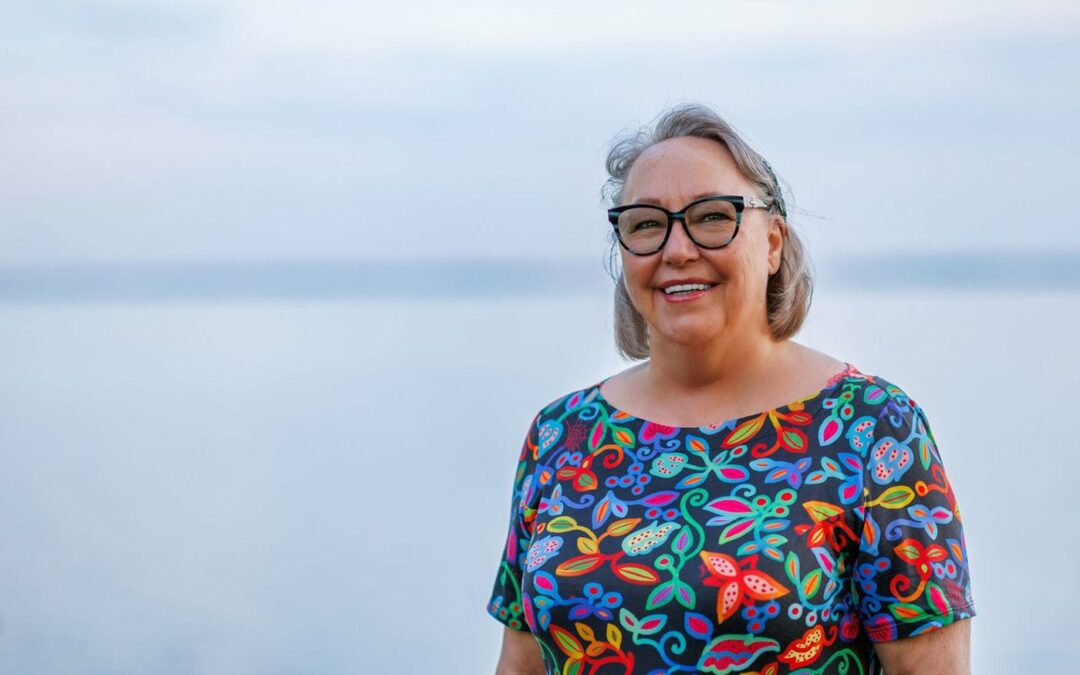Photo: Siila Watt-Cloutier is a renowned Inuk leader and Nobel nominee known for linking Arctic climate change to human rights and championing Indigenous voices on the world stage / Courtesy of PICS
By Sonal Gupta
Local Journalism Initiative Reporter
Canada’s National Observer
Siila Watt-Cloutier remembers gliding by dog sled across the frozen Arctic as a child — past landscapes that are now vanishing before her eyes. Through her new podcast, the Inuk leader and climate advocate is spotlighting Indigenous perspectives and the challenges facing the region.
“We are hit very hard up in the Arctic. We hear and see it every single day,” Watt-Cloutier said. “Listen to those voices on the ground, not just the politicians.”
The four-part, limited series, A Radical Act of Hope, produced by the BC-based Pacific Institute for Climate Solutions draws on her 2015 memoir, The Right to Be Cold, which frames climate change as fundamentally a human rights crisis, rather than solely a scientific or environmental issue.
“Not that many people read books today,” she said. “With podcasts now being the ‘it’ medium, why not contribute in some small way a narrative that I believe needs to shift?”
The podcast follows Watt-Cloutier’s personal journey, from her early years in Kuujjuaq, a remote Inuit community in northern Quebec and speaking only Inuktitut, to her work negotiating the Stockholm Convention to ban toxic chemicals in the Arctic and leading the first legal petition linking climate change to human rights at the Inter-American Commission on Human Rights.
“This is just a small contribution from my perspective on what I felt has worked for me in terms of changing the minds and hearts of people through the work that I’ve done,” Watt-Cloutier said.
The call for a new narrative comes as she voices concern about the current direction of climate policy. Watt-Cloutier is critical of the current political tone in the climate debate, describing it as “eco-based, fear-based leadership that is creating even more chaos and more wars.”
As governments fast-track mining and infrastructure projects in the North, she warns the Arctic is increasingly being viewed as a business opportunity rather than an environmental disaster.
“Don’t see the Arctic issues — and the rich minerals and resources that are there as a result of the melt — as an opportunity,” she said. “See it as an environmental disaster, and then work from there to build the economy of the Arctic that’s not going to make things worse. It shouldn’t be that the economy is going to be the trump card again. Building our economy should not be at the cost of lowering greenhouse gas emissions.”
Arctic sea ice reached its lowest winter maximum on record this March, with the National Snow and Ice Data Centre reporting just 14.33 million square kilometres at its peak — more than a million square kilometres below the long-term average and the smallest extent in the satellite era. As the ice vanishes, new shipping lanes and mineral frontiers are opening, fuelling expectations of a scramble for oil, gas and critical minerals. The environmental toll is mounting: permafrost is thawing, releasing methane and carbon dioxide, while coastal erosion and wildfires are accelerating.
The project is led by Ian Mauro, executive director of the Pacific Institute for Climate Solutions, an environmental scientist and filmmaker who has worked with Watt-Cloutier for over a decade.
Mauro said the podcast is a response to a “green backlash” — the growing pressure to put climate action on hold for short-term economic fixes like expanding fossil fuel projects and accelerating resource extraction, particularly in the face of Trump’s trade war.
“We cannot afford to backtrack on our climate ambition at the expense of these other issues,” Mauro said. “We have to figure out how to multi-solve and be holistic in our approach, which is why leadership matters right now.”
Mauro said the series comes at a time when Indigenous knowledge is finally being recognized as essential to climate solutions, both in Canada and around the world.
“We still live in a deeply racist society where people will quickly dismiss these types of knowledge,” Mauro said. “But we are also in an era of reconciliation where there is a deeper appreciation and respect that has formed culturally in this country, and someone like Siila Watt-Cloutier rises to the surface in that conversation.”
Each episode features Indigenous women leaders, including Lena Evic, founder of Iqaluit’s Pirurvik Centre, and Nicole Redvers, a planetary health expert. In the final episode, former Greenland premier Aleqa Hammond joins a discussion about Arctic geopolitics and Indigenous sovereignty.
“I didn’t want these podcasts just to be my take on conscious leadership,” Watt-Cloutier said. “I wanted to invite other Indigenous women to share this platform, to share their stories — women that I feel are already leading from that space of consciousness and wisdom.”
Co-host Janna Wale, the institute’s Indigenous research and partnerships lead, who is Gitxsan and Cree-Métis, called the series “long overdue.”
She said the podcast was designed to break through the “eco-grief and eco-anxiety” dominating climate news by centring Indigenous knowledge and climate optimism.
“Indigenous people have been climate leaders since time immemorial,” Wale said. “We have had relationships with the land that have helped to foster sustainability and practices that have contributed to bringing balance to our ecosystems. Centring these voices, centring those ideas, and inspiring the next generation of leaders using that kind of knowledge is so important.”
Watt-Cloutier said Indigenous knowledge and leadership are essential as Canada faces accelerating Arctic change.
“The land and culture offer more solutions, I think, than most institutions can,” she said. “I believe strongly that Indigenous wisdom is the medicine the world seeks in addressing these issues of sustainability … Rather than seeing us as victims to globalization and to pollution and to climate change, we can become teachers if given the opportunities of respect and equality and equity on every front.”
